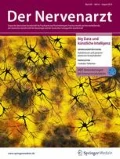Zusammenfassung
Achtsamkeitsbasierte Psychotherapie hat ihre Ursprünge in der fernöstlichen Meditationskultur. Im psychotherapeutischen Kontext fokussieren achtsamkeitsbasierte Konzepte als störungsübergreifende modulare Komponenten einerseits auf die Verbesserung der Akzeptanz unangenehmer Lebensumstände und Emotionen, andererseits auf die Verbesserung der „metakognitiven Wahrnehmung“, d. h. der emotionsfreien Beobachtung intrapsychischer Prozesse. Derzeit liegen 5 ausgearbeitete achtsamkeitsbasierte Konzepte vor, jedoch mit unterschiedlichem Wirksamkeitsnachweis: Während etwa die „mindfulness-based cognitive therapy“ (MBCT) in der Rückfallprophylaxe der rezidivierenden Depression als wirksam eingestuft werden kann, sind für die weit verbreitete „mindfulness-based stress reduction“ (MBSR) lediglich geringgradige Effekte nachgewiesen. Zusammenfassend zeigt die Datenlage, dass Achtsamkeit als Baustein einer modular konzeptionalisierten Psychotherapie sinnvoll und wirksam sein kann.
Summary
Mindfulness-based psychotherapy is rooted in the Far East meditation culture. In the context of psychotherapy mindfulness-based treatment programs mostly include mindfulness as modular components aiming at acceptance of aversive circumstances or emotions and on improvement of metacognitive awareness. Currently there are five mindfulness-based concepts with different proof of effectiveness: mindfulness-based cognitive therapy (MBCT) can be classified as effective in reducing the risk of relapse in patients with recurrent depression, whereas the popular mindfulness-based stress reduction program (MBSR) reveals only small effect sizes. In summary, mindfulness used as one component in modular conceptualized treatment programs seems to be both acceptable and effective.
Literatur
Bishop S, Lau M, Shapiro S et al (2004) Mindfulness: a proposed operational definition. Clin Psychol; Sci Pract 11:230–241
Otti A, Gündel H, Wohlschläger A et al (2012) „Default-mode“-Netzwerk des Gehirns. Nervenarzt 83:16–24
Hayes SC, Strosahl K, Wilson KG (1999) Acceptance and commitment therapy: an experiential approach to behavior change. Guilford Press, New York
Schmitz H (2012) Kurze Einführung in die Neue Phänomenologie. Karl Alber, Freiburg
Wells A (2009) Metacognitive Therapy for Anxiety and Depression. Guilford Press, New York
Michalak J, Heidenreich TH, Williams M (2012) Achtsamkeit. Fortschritte der Psychotherapie. Hogrefe Göttingen
Kabat-Zin J (1990) Full catastrophe living: the program of the stress reduction clinic at the University of Massachusetts Medical Center. New York Delta
Segal Z, Williams J, Teasdale J (2002) Mindfulness-based cognitive therapy for depression: a new approach to preventing relapse. Guilford Press, New York
Linehan M (1993) Cognitive-behavioral treatment of borderline personality disorder. Guildford Press, New York
Keng SH, Smoski M, Robins C (2011) Effects of mindfulness on psychological health: a review of empirical studies. Clin Psychol Rev 31:1041–1056
Hofmann SG, Sawyer AT, Witt AA, Oh D (2010) The effect of mindfulness-based therapy on anxiety and depression: a meta-analytic review. J Consult Clin Psychol 78:169–183
Bohlmeijer E, Prenger R, Taal E, Cuijpers P (2010) The effects of mindfulness-based stress reduction therapy on mental health of adults with a chronic medical disease: a meta-analysis. J Psychosom Res 68:539–544
Schmidt S, Grossman P, Schwarzer B et al (2011) Treating fibromyalgia with mindfulness-based stress reduction: results from a 3-armed randomized controlled trial. Pain 152:361–369
Segal Z, Williams M, Teasdale J (2008) Die Achtsamkeitsbasierte Kognitive Therapie der Depression: Ein neuer Ansatz zur Rückfallprävention. DGVT, Tübingen
Piet J, Hougaard E (2011) The effect of mindfulness-based cognitive therapy for prevention of relapse in recurrent major depressive disorder: a systematic review and meta-analysis. Clin Psychol Rev 31:1032–1040
Kuyken W, Byford S, Taylor RS et al (2008) Mindfulness-based cognitive therapy to prevent relapse in recurrent depression. J Consult Clin Psychol 76:966–978
Segal ZV, Bieling P, Young T et al (2010) Antidepressant monotherapy vs sequential pharmacotherapy and mindfulness-based cognitive therapy, or placebo, for relapse prophylaxis in recurrent depression. Arch Gen Psychiatry 67:1256–1264
Heiden C van der, Muris P, Molen HT van der (2012) Randomized controlled trial on the effectiveness of metacognitive therapy and intolerance-of-uncertainty therapy for generalized anxiety disorder. Behav Res Ther 50:100–109
Bohus M (2002) Borderline-Störungen. Fortschritte der Psychotherapie. Hogrefe, Göttingen
Bohus M, Wolf M (2012) Achtsamkeit-Schritte zur Seelischen Gesundheit. Audiobook. Schattauer, Stuttgart
Soler J, Valdepérez A, Feliu-Soler A et al (2012) Effects of the dialectical behavioral therapy-mindfulness module on attention in patients with borderline personality disorder. Behav Res Ther 50:150–157
Hayes S, Luoma JB, Bond F et al (2006) Acceptance and commitment therapy: model, process, and outcomes. Behav Res Ther 44:1–25
Powers MB, Vörding M, Emmelkamp PMG (2009) Acceptance and commitment therapy: a meta-analytic review. Psychother Psychosom 8:73–80
Interessenkonflikt
Der korrespondierende Autor weist auf folgende Beziehungen hin: Vorstand DDBT (Deutscher Dachverband DBT), wissenschaftliche Kooperation mit Linehan [9].
Author information
Authors and Affiliations
Corresponding author
Rights and permissions
About this article
Cite this article
Bohus, M. Achtsamkeitsbasierte Psychotherapie. Nervenarzt 83, 1479–1489 (2012). https://doi.org/10.1007/s00115-012-3555-0
Published:
Issue Date:
DOI: https://doi.org/10.1007/s00115-012-3555-0
Schlüsselwörter
- Psychotherapie
- Achtsamkeitsbasierte Stressreduktion
- Dialektisch behaviorale Therapie
- Akzeptanz- und Commitmenttherapie
- Achtsamkeitsbasierte kognitive Therapie

